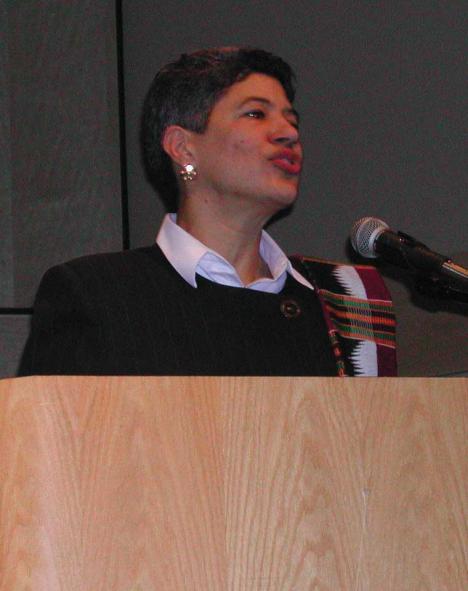 Fran McQueen
Fran McQueenSociety must embrace a day-to-day nonviolent methodology said violence prevention expert Dr. Deborah Prothrow-Stith during her speech last Thursday in the University Center Otto Budig Theater.
“It means learning to get along, it means learning conflict resolution skills and perfecting them,” she said.
The lecture touched on several public health perspectives on violence. Among the interrelated topics Dr. Prothrow-Stith discussed was what she described as four waves of youth violence.
The first wave began in the early 1980s and involved predominately young black and Hispanic males in poor urban communities. America responded by increasing law enforcement and establishing zero-tolerance, she said.
In contrast, after the second wave of violence struck communities such as Columbine, Littleton Colorado and West Paducah, Ky, more people became empathetic, she said. “Our response now is more oriented towards mental health. Instead of school police we want the school psychologist,” said Dr. Prothrow-Stith.
But even in the second wave the focus has been mainly on the individual and little has been done about the cultural environment.
Society’s acceptance and glamorization of violence is contributing to a third wave of increasing female violence, she said.
“Girls now make up 25 percent of the teenagers arrested for violent crimes,” Dr. Prothrow-Stith said. “That number used to be rare.”
Youth-directed shows like the Power Rangers are an example of how women are increasingly depicted in more violent, aggressive roles, she said.
“I call it the feminization of the super hero,” she said. “We’ve been doing it long enough to raise a generation of girl children who learn to solve their problems with violence.”
She also said girls may be victimized more in homes than boys and witness the same amount of domestic violence, but it’s nothing new. Girls used to run away, take drugs, become prostitutes or demonstrate other ways of internalizing the trauma.
“I think this trend of girls participating in violence and being arrested for violent crimes reflects taking that trauma and externalizing it now,” she said.
The next epidemic may occur in preschool adolescents. Teachers are becoming more concerned as youngsters imitate older generations without showing awareness of what they’re doing, said Dr. Prothrow-Stith. Better ways to reduce youth violence will likely appear when one examines the whole picture instead of dividing the issue into distinct categories like gang violence, violence against women, child abuse and so on.
“The relationship is where I think we’ll find more solutions and more help for people and family and communities,” she said.
Dr. Prothrow-Stith also said society must elevate the things that are necessary for getting along; such as forgiveness, empathy, conflict resolution skills and compromise.
Brandon Hill, a sophomore majoring in Anthropology said he found the lecture to be very enlightening. “She’s one of the best speakers that has ever come to NKU, since I’ve been here,” he said.
Dr. Prothrow-Stith is currently a professor and associate dean for faculty development in the Department of Health Policy and Management at Harvard.

